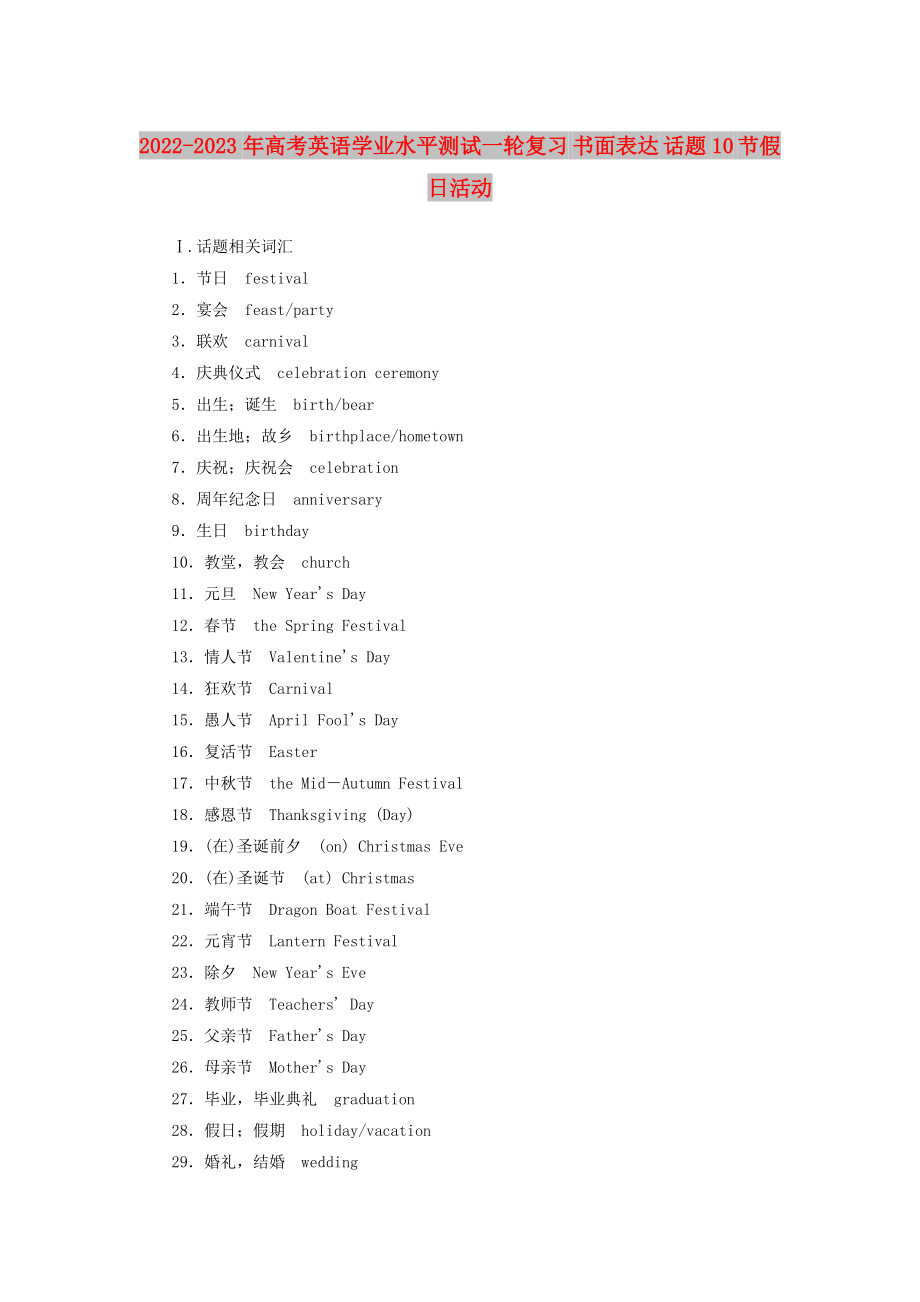《2022-2023年高考英語學(xué)業(yè)水平測試一輪復(fù)習(xí) 書面表達(dá) 話題10 節(jié)假日活動》由會員分享,可在線閱讀��,更多相關(guān)《2022-2023年高考英語學(xué)業(yè)水平測試一輪復(fù)習(xí) 書面表達(dá) 話題10 節(jié)假日活動(4頁珍藏版)》請在裝配圖網(wǎng)上搜索。
1、2022-2023年高考英語學(xué)業(yè)水平測試一輪復(fù)習(xí) 書面表達(dá) 話題10 節(jié)假日活動
Ⅰ.話題相關(guān)詞匯
1.節(jié)日 festival
2.宴會 feast/party
3.聯(lián)歡 carnival
4.慶典儀式 celebration ceremony
5.出生���;誕生 birth/bear
6.出生地;故鄉(xiāng) birthplace/hometown
7.慶祝�;慶祝會 celebration
8.周年紀(jì)念日 anniversary
9.生日 birthday
10.教堂,教會 church
11.元旦 New Year's Day
12.春節(jié) the Spring Festiva
2����、l
13.情人節(jié) Valentine's Day
14.狂歡節(jié) Carnival
15.愚人節(jié) April Fool's Day
16.復(fù)活節(jié) Easter
17.中秋節(jié) the Mid-Autumn Festival
18.感恩節(jié) Thanksgiving (Day)
19.(在)圣誕前夕 (on) Christmas Eve
20.(在)圣誕節(jié) (at) Christmas
21.端午節(jié) Dragon Boat Festival
22.元宵節(jié) Lantern Festival
23.除夕 New Year's Eve
24.教師節(jié) Teachers' Day
3�����、
25.父親節(jié) Father's Day
26.母親節(jié) Mother's Day
27.畢業(yè),畢業(yè)典禮 graduation
28.假日�����;假期 holiday/vacation
29.婚禮,結(jié)婚 wedding
30.裝飾��,修飾 decoration
31.聚會 get-together/reunion/gathering
32.慶典 ceremony
33.社交活動 social activity
34.開幕式 opening ceremony
35.閉幕式 closing ceremony
36.暑假 summer holiday/vacation
37.寒假 wi
4��、nter holiday/vacation
38.每日的�����;日常的 daily/everyday
39.紀(jì)念品 souvenir
40.民間的 folk
41.私人的 private/personal/individual
42.規(guī)則的,經(jīng)?!egular
43.緊密相關(guān)����,有意義的 relevant
44.宗教的 religious
45.興高采烈的,快活的 cheerful
46.難忘的 unforgettable
Ⅱ.話題相關(guān)詞組
1. 回顧 look back
2. 因……祝賀某人 congratulate...on
3. 順便走訪(某人) drop in
5、4. 聚會��,聯(lián)歡 get together
5. 參加�,加入 join in
6. 盼望 look forward to/be eager to do
7. 演出 put on a performance
8. 在出生時 at birth
9. 發(fā)生;舉行�����;舉辦 take place/e up
10.與某人玩得開心 have fun with sb./have fun doing
11. 因……欽佩某人 admire sb.for sth.
12. (偶然)遇見(或發(fā)現(xiàn)) e across
13.燃放煙花 set off fireworks
14.吃團圓飯 have fam
6、ily reunion dinner
15.追溯于/到 date from/date back to
16.欣喜若狂 be wild with joy
17.迫不及待 can't wait to do
Ⅲ.實用句型
1.在新雪的襯托下,樹上光禿禿的樹枝在圣誕節(jié)的燈光中熠熠生輝��。
The bare branches of the trees were shining with Christmas lights against the new fallen snow.
2.然后圣誕樹上的燈打開了��,這使得大家高興起來�����。
Then the Christmas lights on t
7���、he Christmas tree were turned on, causing everyone to cheer with delight.
3.這個雕像是為了紀(jì)念那位有名的科學(xué)家而建立的�。
The statue was built in memory of the famous scientist.
4.他特意打扮成圣誕老人逗孩子們樂���。
He dressed up as Father Christmas /Santa Claus on purpose to amuse the children.
5.我盼望著假期早日到來�����。
I'm really looking forwar
8、d to our vacation.
6.孩子們剛在院子里燃放煙花�。
The children set off the fireworks in the yard just now.
Ⅳ.佳作背誦
中國傳統(tǒng)新年是春節(jié)�。請你寫一篇題為“The Spring Festival”的短文介紹這一傳統(tǒng)節(jié)日����。內(nèi)容包括:
1.時間�����;
2.慶?�;顒?����;
3.你是否喜歡這個節(jié)日,為什么?
注意:詞數(shù)80個左右�;開頭已給出�����,不計入總詞數(shù)。
寫作提示:題目要求描寫春節(jié)����,寫作時使用一般現(xiàn)在時�����。
The Spring Festival
Chinese New Year, also called
9、the Spring Festival, is the most important and energetic festival for all Chinese people.___________
_______________________________________________________
_______________________________________________________
_______________________________________________________
___________________________
10��、____________________________
_______________________________________________________
_______________________________________________________
_______________________________________________________
[參考范文]
The Spring Festival
Chinese__New__Year,__also__called__the__Spring__Festival,__is__the__mo
11����、st__important__and__energetic__festival__for__all__Chinese__people.It usually falls in January or February when students are taking winter holidays.
Before the festival, people usually clean up the house and make it clean and tidy. On the Spring Festival Eve���,people always have a big dinner with the
12���、ir family. Of course����,dumplings, fish and chicken are the traditional food on the dinner table. After that,adults give children lucky money in a red paper and then people watch TV or talk until midnight to wele the new beginning. On the next morning, everyone puts on their new clothes and visits their relatives or friends to wish them a happy new year.
To be honest��,I like this festival because I can get lucky money from my family and relatives.
 2022-2023年高考英語學(xué)業(yè)水平測試一輪復(fù)習(xí) 書面表達(dá) 話題10 節(jié)假日活動
2022-2023年高考英語學(xué)業(yè)水平測試一輪復(fù)習(xí) 書面表達(dá) 話題10 節(jié)假日活動

